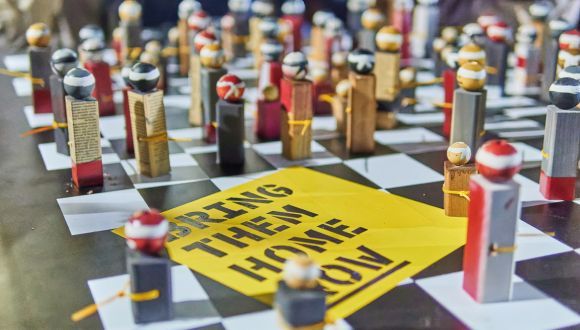From Hostage Situations to Flea Markets: How to Negotiate Anything
Prof. Hilla Dotan breaks down what it takes to negotiate like a pro
What would you say to someone who wants to improve their negotiation skills?
I recommend joining my course Managing Negotiations or other courses and workshops, which are highly practical and provide valuable tools that can enhance both your professional and personal life.
Negotiation is a skill that touches every part of our lives, from deciding who drives the kids to school or what to pay for a product, to high-stakes deals like selling a startup or resolving court disputes. A poignant example today is Israel's national negotiation for the return of hostages from Gaza. At its heart, negotiation is about communication to resolve conflicts and find solutions. Whether in everyday decisions or major crises, effective preparation, planning, and evaluation are key to success. Prof. Hilla Dotan Dykstein, a senior faculty member at the Coller School of Management at Tel Aviv University, specializing in business and international negotiations, shares practical tools to help us become sharper, more strategic negotiators.
1. Dr. Dotan, how would you define a successful negotiation?
Many believe that obtaining one's desired outcome is an indication of a successful negotiation. From my perspective, this is not necessarily an indication of success. First, it could be that the outcome we set was wrong, and second many more factors should be considered when we evaluate a negotiation. One, is indeed that we reached the correct outcome, Second, we should evaluate the process that we led toward that outcome. For example, if two negotiators reach the same deal—one in a year, the other in a month—the latter’s approach is clearly more efficient. Thus, the process we lead, the resources spent, time, cost, risk and most importantly, the relationships that we build along the process with the other negotiator as well as the reputation that we build or enhance, are critical factors to take into account in evaluating a negotiation and it's success.
Moreover, the success of a negotiation should be evaluated over the long run, not today as there are consequences for what we close not only in the short run but over time. We can see the consequences of the Gilad Shalit deal in the current hostage negotiation. Success in negotiation goes beyond just achieving the desired outcome, it is balancing achieving your goal while maintaining efficiency and considering lasting impacts.
2. When is the right time to make your first offer in a negotiation? Does making the first offer provide an advantage?
The question of whether to be the first to provide an offer in a negotiation- or whether to anchor the negotiation- is an often debated question. Some suggest making the first offer, while others advise against it. My perspective is that it depends. It depends on the context, the type of negotiation, the parties involved and more. However, my key takeaway is that anchoring is not a game. When you make your first offer, consider mostly what you would like to signal to the other side. Your offer even if it's simply a price, can send various messages, and people may interpret it differently.
For example, in a job interview, if you propose a salary of 15K (when the industry range is 20-25K), you may signal that you don’t know the market or are undervaluing yourself. Alternatively, asking for 30K signals a higher expectation, which could lead to different perceptions and interpretations about your candidacy and even your alternatives.
In general, if you make a specific offer, be prepared to justify it. For instance, if you ask for 30K, you should have a valid reason for that request, such as another offer from a competitor. Having a strong alternative (BATNA) provides leverage, as it also gives you the option to walk away if needed.
My personal tendency is to hear the other side’s offer first. Mostly because this allows me to gather more information about the other side, read their signal before responding with a counter-offer.
3.What are the most common mistakes people make in negotiations?
The biggest negotiation mistake is lack of proper preparation. People often make assumptions instead of asking questions. They often let ego or overcommitment cloud their judgment, and overlook long-term consequences of their decisions and agreements. Many forget that reputation matters even in one time interactions and fail to consider the impact of their actions in the long run. Sometimes the best choice is to avoid the negotiation or delegate it to someone more suited. Awareness of your own abilities and pitfalls is critical for preparing and planning an effective negotiation process including who is best to conduct it.
4. How do you handle a situation where the other side refuses to compromise?
When the other side refuses to compromise, it often relates to their power in the negotiation. My advice is to always analyze the source of power in a negotiation. However, remember that power is relative. Sometimes, we focus so much on our weaknesses that we overlook the fact that the other side might be just as constrained making us more powerful than we actually anticipated
A key way to strengthen your position is by having a strong BATNA (Best Alternative to a Negotiated Agreement). A solid alternative gives you the ability to walk away if necessary, which reduces dependence on the other party’s willingness to compromise.
If the other side seems unwilling to compromise, it might be because they truly can't. In such cases, introducing new issues to the negotiation—things that matter to them but are less significant to you—can help break the deadlock. For example, an employer might not be able to meet your salary expectations but could offer to fund your MBA or MA studies, which typically come from a separate budget. Similarly, offering benefits like vacation days, stock options, or a signing bonus could help move the negotiation forward. In general, when you feel you have reached a "dead-end" regarding one issue, adding additional issues that may be important to the other side and hold less weight for you (and vice versa) is the way to deal with the difficult issues.
5. What tools or methods would you recommend for successful negotiation?
Negotiate ethically
Never resort to lying, threatening, or using unethical tactics. Preparation is key, and with it, there’s no need for extreme measures. Your reputation follows you everywhere—sometimes it’s better to lose a small battle today to protect your long-term relationships. reputation and integrity.
Build Trust and Relationships
Every negotiation is an opportunity to build trust and partnerships. You never know when you will meet again. I don’t believe in one-time interactions or the short-term. We live in a global world and everyone knows everyone. You never know when you will meet again.
6. If you had to give one tip about negotiations, what would it be?
The most important tip about negotiations is: PREPARATION and AWARENESS.
One of the key lessons I’ve learned from years of conducting and guiding complex negotiations and especially from over 18 years of teaching, is that preparation is crucial, but it’s equally important to know how to prepare and how to evaluate a negotiation afterward.
Even skilled negotiators may struggle in unfamiliar contexts or with different parties. It’s important to know your strengths and weaknesses—whether you perform better with strangers, colleagues, or specific groups, cultures and types of negotiations. Preparation and awareness of your abilities in different contexts is key. Moreover, after the negotiation, review whether your goals were met, the process was efficient, whether you reached the correct outcomes and whether your reputation was enhanced.
Prof. Hilla Dotan Dykstein is a senior faculty member at the Coller School of Managementt at Tel Aviv University, specializing in business and international negotiations. An internationally recognized speaker and advisor, she also heads a private consulting firm where she advises governments, global executives, and intelligence officials on complex negotiations.

Prof. Hilla Dotan.



